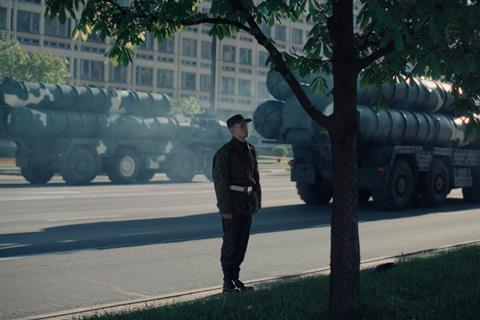Belarus army hazing rituals are a deathly sign of the Soviet past - and a bloody presence in what is happening across the region right now

Dir/scr: Hanna Badziaka, Alexander Mihalkovich. Sweden/Ukraine/Norway. 2023. 92mins
It’s known as ‘dedovshchina’, which literally translates to ’the rule of Grandads’: the brutal hazing of new recruits which originated in the Soviet army and has persisted in the militaries of former Soviet states – including, in this case, Belarus. In some instances it amounts to torture, in others it results in death. This bruising documentary by Hanna Badziaka and Alexander Mihalkovich follows two individuals: Nikita, a young conscript about to embark on compulsory military service; and Svetlana, dogged in her quest for justice after the hazing death of her son Sasha. As unrest builds in Belarus following the contested re-election of Putin sympathiser Aleksandr Lukashenko in 2020, the film demonstrates how this culture of extreme violence has bled into wider Belarussian society, in particular the police. It’s tense, essential filmmaking which, with its stormy colour palette and wintry gloom, gives a mounting sense of oppressive tension.
This is a textured, layered documentary that builds into a multi-faceted portrait of a country
This is a textured, layered documentary that builds into a multi-faceted portrait of a country. Even without the current conflict in the region, it would be fascinating. But set against the spectre of reported Russian military atrocities during the war in Ukraine, the film takes on a grim added currency. It’s the documentary feature debut for Badziaka and the second full-length documentary from Mihalkovich (his first was My Granny From Mars), whose bleakly matter-of-fact letters home from his own military service, used as a sparse narration, provide an insight into the mindset of the conscript.
To understand the normalisation of violence within the military in Belarus, it helps to appreciate the elevated symbolic role of the armed forces within the country as a whole. Like Russia, Belarus is inordinately fond of huge, flexing displays of military might, of endlessly celebrating past victories. The film opens with a shot of a crowd of civilians, wrapped up against a damp chill, trudging through mud towards the distant fanfare of military music. A rain-sodden banner reads ’Honour and Motherland above Everything’. It’s a graduation ceremony for army cadets, the crowd of family and friends capturing every moment on their phones. “Good guys”, mutters one onlooker in approval.
Away from the parade ground, huge Orwellian rotating billboards carry pictures of noble soldiers smiling benevolently, with militaristic slogans: ’We have something to be proud of, something to defend.’ There is a persistent idea, particularly among the older generation, that military service is the making of a man. Nikita’s father lectures his son: “All the unruly twists and bends that your mind creates will be nicely straightened out by the sharp-edged military order.” Nikita, however, is less convinced. His friends from the Belarus club scene urge him to “pull a nutcase” to get out of conscription, but he is resigned to his fate. He just hopes he can settle back into normality once he’s done his time.
What is striking, however, is how quickly Nikita is relegated to the other side of the ‘us and them’ delineation that separates young Belarusians from the figures of authority. This division is emphasised by smart editing and framing, and by the schism that opens up across the country when protests erupt against the election. Nikita’s friends take to the streets; his fellow cadets are mobilised to repress them. They do so with violence. But it’s the police force, largely made up of former military men shaped by dedovshchina, that is the most brutal. Shocking footage captures the aftermath of a police beating on the street which results in a man’s death.
Svetlana, meanwhile, is constantly on the move, taking trains across the country to sit in other homes equally paralysed by grief and anger over sons needlessly lost to the hazing rituals. Conversation by conversation, she raises awareness of the problem, and calls for the public and the authorities to acknowledge it. Her progress is, however – like so much else in the region – effectively wiped out by the current conflict.
Production companies: Sisyfos Film, Voka Films
International sales: Lightdox anna@lightdox.com
Producers: Mario Adamson, Alexander Mihalkovich, Ashley J. Smith
Cinematography: Siarhiej Kanaplianik
Editing: Katiia Vushnya























